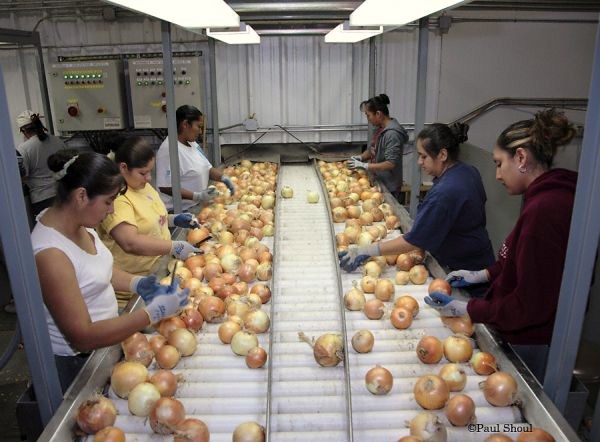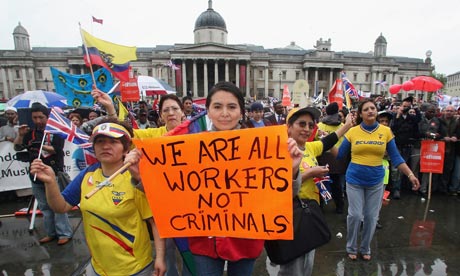The Female Migrant Worker: What Are Her Reproductive Rights
Today is Migrant’s Day. While female citizens of a country are discriminated against when they seek abortions, how can migrant workers access abortion services? Read more.
Globalization has not lead to the outsourcing of jobs as we saw in yesterday’s blog, but it has in fact increased opportunities for people to travel abroad for work. While a smaller percentage of these men and women travel abroad for skilled work, most of these immigrants leave their homes to do unskilled work at cheaper rates than local labourers, and while doing this make more than they might for similar jobs in their own home country.
Among these are several Asian women to travel to other cities within their own countries, or to neighboring countries, richer Asian countries or even to the West, most often in the capacity of domestic help, nannies, construction site labourers, and sometimes in the capacity of semi-skilled factory workers. They cannot all be clubbed together: some of them leave home as legal immigrants; others often take a risk and enter another country without a permit.
At the CEHAT Post-Graduate Course for Health and Human Rights, we discussed the sexual and reproductive rights of women who migrate for unskilled or semi-skilled labour.
 Women in these groups suffer discrimination on three fronts: gender, class and their immigration status. As women they are targets of men within their community, as lower class women they find themselves unable to negotiate with their employers, and as immigrants, they are subject to the countries laws on reporting sex crimes. In recent times several media reports have thrown light on the brutality of some of these situations.
Women in these groups suffer discrimination on three fronts: gender, class and their immigration status. As women they are targets of men within their community, as lower class women they find themselves unable to negotiate with their employers, and as immigrants, they are subject to the countries laws on reporting sex crimes. In recent times several media reports have thrown light on the brutality of some of these situations.
One recent story that surfaced from Saudi Arabia was particularly shocking: A Filipino woman, the mother of three, was raped by a Bangladeshi coworker. When she reported, she was found to be pregnant. When enough evidence of rape was not found, she was imprisoned for an “illicit affair” and sentenced to flogging. Her last phone call home suggested that she had miscarried and that the punishment could be carried out at any possible time.
Less commonly, these women are also targets of hate crimes, often resulting from the view that immigrant workers are responsible for unemployment among the local communities.
 When such abuse results in unwanted pregnancies, these women face several barriers in accessing safe terminations. One barrier could be the very law: the country of immigration might not allow abortions unless rape can be proved. Women migrating to the Middle East often face such dilemmas. In other countries like the U.S., abortions can be expensive unless insured accordingly. Illegal immigrants face another additional dilemma. Reporting a rape, seeking delivery or abortion services could easily get them deported. Some immigrants who have braved reporting have later complained of being abused in detention.
When such abuse results in unwanted pregnancies, these women face several barriers in accessing safe terminations. One barrier could be the very law: the country of immigration might not allow abortions unless rape can be proved. Women migrating to the Middle East often face such dilemmas. In other countries like the U.S., abortions can be expensive unless insured accordingly. Illegal immigrants face another additional dilemma. Reporting a rape, seeking delivery or abortion services could easily get them deported. Some immigrants who have braved reporting have later complained of being abused in detention.
While it is easy to look at immigration as a cross border issue, one cannot forget women who leave their homes to work in another city within the country. While they are subject to different laws, they are vey often subject to communal clashes and hate crimes. Once again these women become targets of sexual violence, which is used very often in communal clashes as a weapon of intimidation. Such women find it hard to access health care, and seek abortion even within their own countries, because of the fear of prejudice, as well as the stigma surrounding abortion.
It is also important to recognize that while sexual violence is the weapon of choice against these vulnerable groups, there must be a mass movement making abortion accessible to them. This might be one group where international covenants like CEDAW might be extremely useful: when the law of the land restricts access to an unwanted pregnancy resulting from violence sexual abuse, it is key that powerful international forces push the country to provide justice for vulnerable women.
Globalization is here to stay. At least for a while. And so while, in the long run a more inclusive kind of economy might benefit all women, it is important to immediately recognize the issues faced by immigrant women as it is important to recognize the empowerment of the middle classes. While it might seem like one comes at the expense of the other – it is easier to provide security to both groups if covenants like the CEDAW are ratified and put into effect.
If you know of migrant workers seeking abortions share this link with them (https://www.womenonweb.org/), or write for them yourself. Women on Web provides genuine pills for safe medical abortion .







